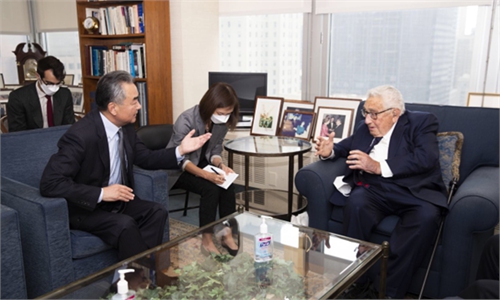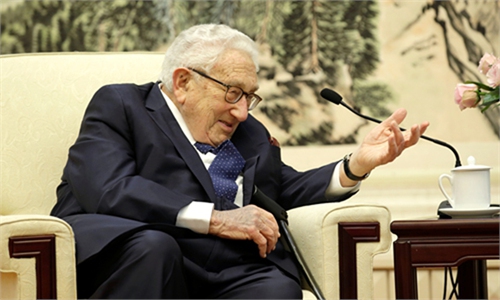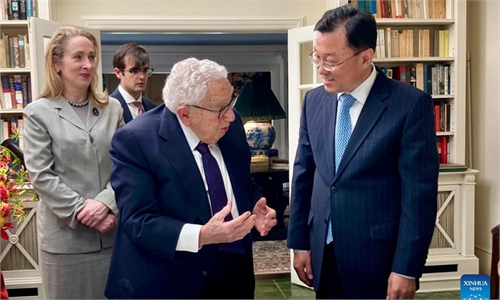IN-DEPTH / IN-DEPTH
Exclusive: Henry Kissinger hopes for restoration of China-US ties, encourages Americans to work for world stability, broader understanding of other nations: biography author
Legacy of a visionary
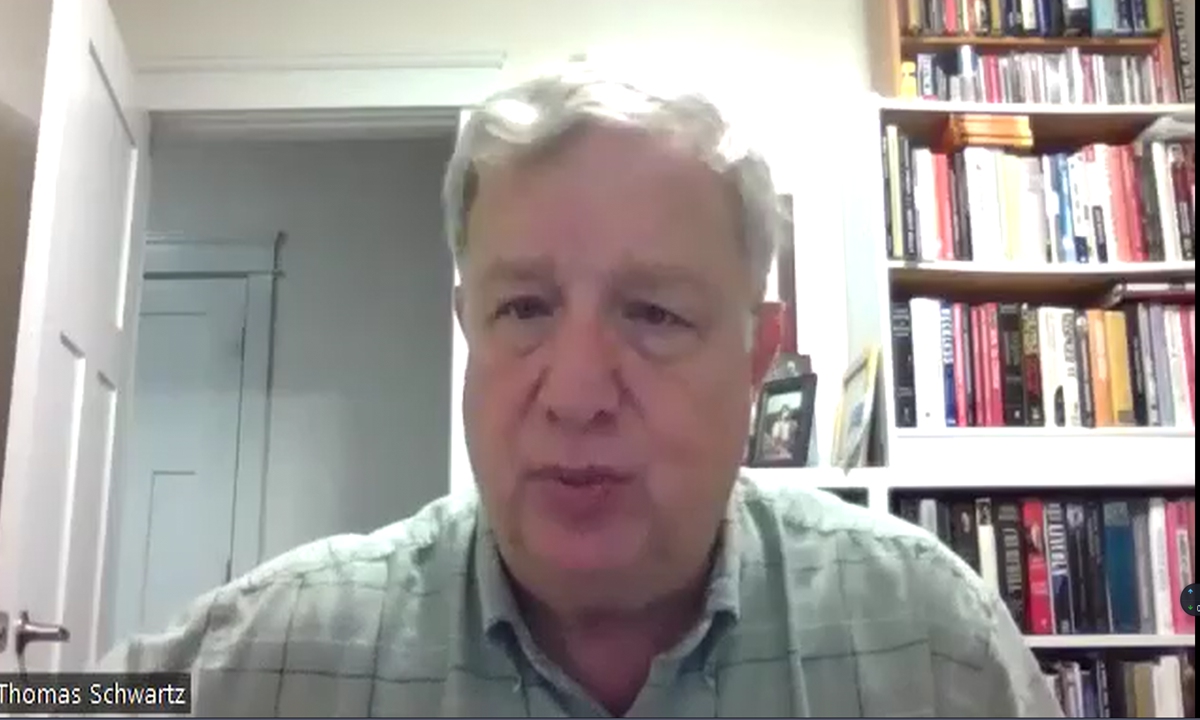
Thomas A. Schwartz, an academician and author of Henry Kissinger and American Power: A Political Biography. Photo: Xie Wenting/GT
Editor's Note:
Henry Kissinger, the eminent diplomat and strategist, played a pivotal role in shaping China-US relations as he spearheaded the historic normalization process between the two countries, fostering dialogue and paving the way for diplomatic engagement that continues to shape the global landscape today. To this day today, the centenarian continues to advocate for cooperation and peace, lending his voice to global issues and emphasizing the importance of collaborative solutions that transcend borders. What legacy did Kissinger wish to leave behind? What are the differences between Kissinger and current US diplomats? Will there be another Kissinger in the US? Global Times reporters Xie Wenting and Bai Yunyi (GT) spoke with Prof. Thomas A. Schwartz, a renowned academician and author of Henry Kissinger and American Power: A Political Biography, on these and other issues of importance.
GT: What initially inspired you to write a biography about Henry Kissinger? During your interaction with him, what about him impressed you most?
Schwartz: Back then, a publisher in the US approached me about the idea of writing a biography of someone whose life experience and work could tell the story of American foreign relations in the 20th century. He asked me to suggest someone. And the person that came to mind was Henry Kissinger. Henry Kissinger has had an extraordinarily long career by any stretch of the imagination. He first came to notice in the US in the 1950s. He was then already writing books on major questions. Being a German Jew who was expelled from Germany, he later returned and actively engaged with the country during the war, even serving as a US soldier at that time. His experience captures something of the US' own role in the world, particularly both in Europe and then in Asia as well. I thought that his biography would be a way to teach my students about the US' role in world affairs.
I had the chance to meet with him to discuss the book. He was very witty, and has a very good sense of humor. He could also be very combative if you ask him questions. And if he doesn't agree with the premise of your question, he'd go right back at you. Even at this age, he is extraordinarily sharp and aware of issues. So it was a very impressive meeting.
It was not that easy because he did not want to talk about some issues. We ended up probably having a very good discussion about soccer, which is one of Kissinger's passions. But we also talked about US foreign policy and I found him very impressive. And it certainly was fun to meet him and to see someone who is as brilliant and interesting as he is.
GT: Henry Kissinger has made great efforts to push forward the normalization of China-US relations. Is there still room for the restoration of China-US relations, both in US political circles and among the general public, despite the current low point in bilateral relations?
Schwartz: Not only do I believe it is necessary, but I believe it is absolutely essential that space be found. Kissinger wrote a famous book called On China, and in that book, he quoted a German philosopher who said that peace would come, either because people became more insightful and rational and realized peace was necessary, or because there was so much destruction and war, peace was the only choice.
I think in a way, the US and China have to find a workable relationship. They are two powerful nations and a conflict or war is both so unthinkable and terrible.
Right now, relations are very bad, but I believe that both countries are unlike in the Cold War era when the Soviet Union and the US were distinctly separate. They did not engage in significant trade, investment, or international visits. Their peoples had little knowledge of each other. The US and China have been very intertwined economically and in political developments over the last 30 years. They have a lot of linkages and connections. So there has to be an effort to overcome some of the differences between the two countries or at least recognition that those differences can be managed and that they are not reasons for direct conflict.
In that sense, what Kissinger talked about and what he hoped for with China is, clearly, that relations need to be restored.
GT: As a historian, how do you predict the development of China-US relations in the coming decades? How do you evaluate the possibility of a war or a military conflict between the two countries?
Schwartz: Certainly, there is the possibility of conflict because the US and China have very different underpinnings in their governmental apparatus. They have very different philosophical notions. Both countries, in a way, consider themselves exceptional. This is something Kissinger said in his book On China, that both countries have a view of themselves as exceptional civilizations. The US has seen itself as a model for the world and has tried to export its system of government and society. China has seen itself as a superior civilization that, in many respects, should be a model for the world as well.
But the basic fact that both see themselves that way does not automatically mean they have to come into conflict. I do think there are some very difficult issues between the two countries, particularly on the Taiwan question and human rights and other issues.
But I think almost all of them could be resolved without conflict. I think an intelligent understanding and a perpetuation of dialogue are crucial. When Kissinger was in office, he began the process of setting up consultations with Chinese leaders. The great thing about Kissinger over the course of his 50 years of his involvement with China was that he was an intermediary between China and the US government. He has carried messages to Chinese leaders from the US and carried them back to American presidents. We need more figures who are in that realm of communicating between the two countries. And we need to have a whole range of institutional dialogues between government, military, and economic officials, so that there is a constant understanding.
But I would agree that as a historian, I could also predict a war, because countries that are powerful often do come into conflict. But I think given the nature of modern weapons and the types of things that can happen to societies in warfare, we have to do everything in our power to avoid such conflict.
GT: What do you think the biggest difference between American diplomats today and Henry Kissinger is?
Schwartz: I think the difference today is a lot of our diplomats have relatively little sense of the broader range of history. Kissinger had a sense from history that terrible things can happen. And I think American diplomats today sometimes don't recognize the degree of danger that can come from careless diplomacy.
In this sense, Kissinger always had a sense that you needed to be extraordinarily careful in undertaking diplomatic tests, and that you should not treat disputes between nations lightly. There is a tendency to think of short-term advantages instead of long-term interests. I think Kissinger had a broader and a longer term sense, partly because he was thinking as a historian, or as someone who has a vision of a longer period.
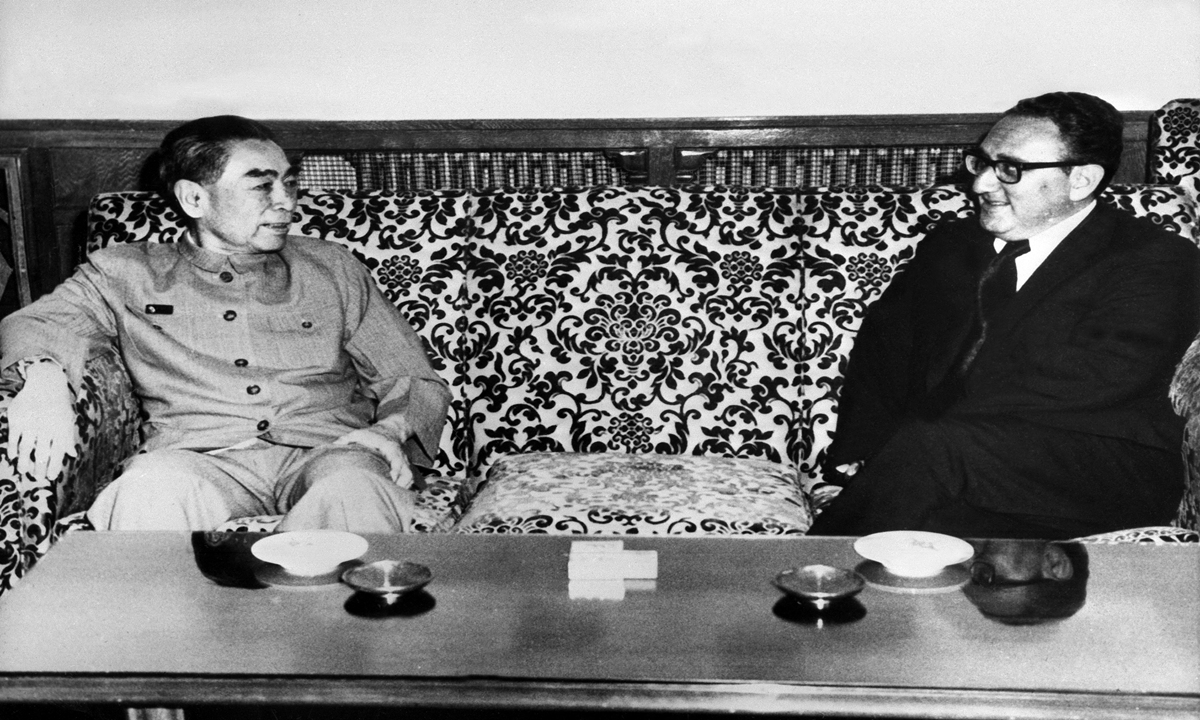
US special envoy Henry Kissinger meets with then-Chinese premier Zhou Enlai (left) in Beijing, in July 1971. Photo: AFP
GT: How did Henry Kissinger's ideas and strategies continue to shape subsequent US administrations in their policies toward China?
Schwartz: The interesting thing is that even though Kissinger left office in 1977, he continued to be a very influential figure. And his ties to China made him an intermediary so that he played a role in the normalization of relations under then president Carter.
When Ronald Reagan came into office, Reagan had been a traditional backer of Taiwan. And Kissinger convinced Reagan, and I think he also convinced the people around Reagan that the US had to accept the one-China policy of the Shanghai Communiqué and that it needed to understand the importance that China had now in American diplomacy.
Kissinger was very instrumental in the fact that the first Communist country that Ronald Reagan visited was China in 1984. He went to China before he went to the Soviet Union. Kissinger has been a sort of intermediary all the way through. He encouraged the US and China to carry out high-level dialogues to understand each other as effectively as they can. I don't think in recent years, that has been the case. What we probably need now are diplomats of a similar type to carry out this policy now. But Kissinger influenced US policy toward China all the way through the Obama administration.
GT: How do you evaluate the lasting influence of Henry Kissinger on the Biden administration? To what extent have his opinions been heard and heeded by this administration?
Schwartz: Obviously, Kissinger has a certain influence. The fact that his opinion is out there is something that political leaders look to, but you're quite right whether they listen to him or not is not always there. I think former president Trump, for example, talked to Kissinger, but did not necessarily listen to him on China. It is the case that there are often other influences, both political and otherwise, affecting things.
I think the legacy of Henry Kissinger is the idea that it is vitally important that the US and China cooperate and compete together, that they understand that they will not always be on the same page, but they also recognize their responsibility as great powers toward maintaining the stability of the global order and maintaining the peace.
In that sense, Kissinger, for example, was very encouraged by China's efforts to bring peace in Europe now, between Russia and Ukraine. So Kissinger was encouraging China to undertake initiatives in that realm. That is the type of influence that he still has, that he is encouraging the idea that the US and China should work together to try to bring peace and stability.
GT: What experience and insights from Henry Kissinger should the current US administration learn from?
Schwartz: I believe they can draw from Kissinger's experience the idea of the importance of consultation, dialogue, and maintaining open communication through constant interaction. Additionally, it is crucial for the US to clearly recognize China as a great power. Furthermore, the US should be direct with China regarding the issues it cares about. That would be the legacy or what the Biden administration could learn.
To a certain extent, the fact that Secretary of State Antony Blinken went to China just recently to meet with Chinese leaders indicates the influence of Kissinger in encouraging the Biden administration to try to improve relations.
That's sometimes difficult with the current political situation. But I think there is an effort on the part of the Biden administration now to reopen some of the channels that have been closed off with China. That's something that I think Kissinger certainly encouraged.
GT: Did you talk about the prospect of a war or a military conflict between the US and China with Henry Kissinger? What's his take on it?
Schwartz: Henry Kissinger has said that China and the US are in the foothills of a possible conflict. And I think by saying this, he means that because relations have deteriorated, there is a danger of there being a misunderstanding.
Kissinger sees a parallel between the situation of the US and China now with the situation of the Great Britain and Germany before WWI. The two countries, Great Britain and Germany, before WWI, were very much linked economically. They did a lot of trade with each other. There was a lot of contact between the two, but they misunderstood each other. The British thought the Germans were out to dominate Europe. The Germans were convinced that the British were trying to prevent them from being recognized as a great power. And they managed to feed this misunderstanding until they went to war. I think Kissinger worries that the US has decided that China is its number one enemy, and China has decided the US is its enemy. This is a dangerous situation.
So I think his feelings are that the two countries have to work to take away this enemy image and recognize that they can be both cooperative and competitive. There doesn't need to be a new cold war; there doesn't need to be a real conflict between them, and they can negotiate their interests.
While he tends toward being pessimistic in the sense that he does fear these things, he also insists and argues that the two countries can overcome this if there is a will on both sides to do so.
GT: Some people said that troubled times call for another Henry Kissinger. Do you think there will be another Kissinger who knows China well and advocates for cooperation in the US?
Schwartz: I don't think there will be another Henry Kissinger. I think what there needs to be is a lot of people similar to Kissinger. There needs to be a lot of Americans and a lot of Chinese people who have an understanding of and appreciation for each other's history and culture, and that are communicating with each other. I think the role of Kissinger is not going to be repeated. Kissinger was a unique figure in a particularly unique time. What is really needed is the type of understanding of China that he brought into US governance and that needs to be more widely disseminated within the US government so that there are more people in our military, our intelligence community, and our diplomatic community who appreciate and understand the issues between the US and China. Hopefully, on the Chinese side, there are also people who appreciate, understand, and recognize some of the issues from the US side.
But honestly, I don't think there's another Kissinger in line in any real sense. I don't think that's likely in the American political system these days. Kissinger really was in a very unique time and circumstance.
GT: Do you believe that the current social environment in the US is conductive to producing more diplomats similar to Henry Kissinger, given the highly tense relationship between China and the US?
Schwartz: I think it's difficult. But when I teach students at the Vanderbilt University and deal with students from other schools, I know that among American young people, there is recognition that the world is changing and that the US needs intelligent diplomats who can recognize these problems and negotiate with other countries. I'm not pessimistic on that ground. I think it's possible.
The real difficulty, I see, is in our broader political environment, to allow such people to have that influence. I think your question certainly pointed at the issue that our political environment is now so polarized and negative, and it's hard for people with constructive ideas about diplomacy and peace to be in positions of power. It tends to reward demagogues and people who are exaggerating or harboring an enemy image for their political purposes.
But I do think there are people available. I'm hoping that the political environment will get better, perhaps after the next election. I think it is possible that we will get better. But I do understand the idea that it might not go that way, and this is one of the dangers we face.
GT: What is the legacy that Henry Kissinger personally wants to pass down to future generations?
Schwartz: What I think he personally wants to pass down is he wants to convince Americans of the importance of promoting and encouraging a stable world environment and the importance of understanding the complexity of international relations, and not to see international relations in black and white terms. He advocates for recognizing a greater complexity and striving for a type of stability and order in the world, as well as recognizing our responsibility to promote stability and order and good relations with other countries.
In that sense, it is important to get out of our own internal problems and environment and to see a broader vision. I think Kissinger hopes that Americans will have a broader historical vision of world stability and a broader understanding of other countries. I think he would like that to be his legacy: A better understanding of the world and of other countries, and of the need for effective diplomacy to maintain peace.
I think sometimes he worries that Americans are not interested enough in foreign policy and diplomacy. They're too concerned with their own problems. And for that reason, they're not going to be effective in dealing with other nations and in promoting a peaceful world order. I think he would like his legacy to be one of encouraging Americans to work for world order and peace.
